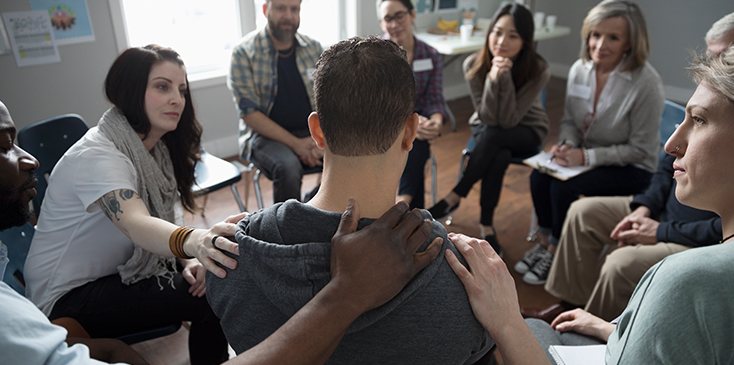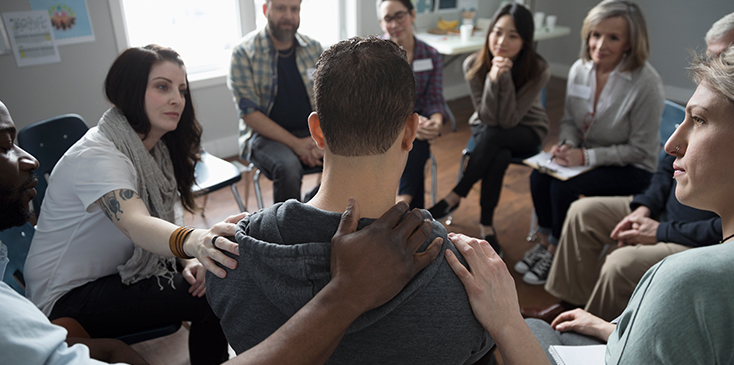
Psychology, as a scientific study of the human mind and its functions relating to behavior, sounds like a pretty heavy topic. So when we asked Dr. Brian Tilley, Associate Professor of Psychology at National University, what psychology means to him, we expected a pretty heavy answer.
Thankfully, Tilley was able to break the subject down into something that perhaps we can all understand and even relate to.
What Psychology Means to Me
“Psychology is quite an expansive field, and I think it probably means a lot of different things to a lot of different people who come from a variety of backgrounds and approaches to it,” says Tilley. “However, in my understanding and experience, psychology is the study of humanity — of how we think, how we act, how we experience feelings. How all three of those influence one another and also influence our relationships with one another.”
According to Tilley, psychology helps us to understand why we react the way we do in certain situations and why some things matter to us more than others. The study of psychology helps us begin to answer many of the complex questions we’ve been asking about how the human mind works for many thousands of years.
Is Psychology an Art or a Science?
Psychology actually has its feet in both camps.
Tilley explains that as a “social science,” psychology tries to be as scientific in its approach as possible, especially when dealing with complex issues like mental illness where very real problems need to be tackled with tried and tested solutions. The “art” in psychology helps deal with the more “human aspect” of the discipline which can be much more difficult or even impossible to tie down with set scientific laws.
“It’s not really science because we don’t have laws of human behavior in the way that you can have the law of gravity,” says Tilley. “But we have theories and ideas that are tested, and we’ve been looking into these theories for many years now. Take a look at some of the theories that Sigmund Freud had, these go back to the 1900s, or the theory of behaviorism which is almost 100 years old right now.”
“You cannot count on people to always act the same way 100 percent of the time. And to me, I think that’s the cool thing about psychology. There are always exceptions, and there is always going to be differences.”
These differences in behavior can sometimes be attributed to the socioeconomic background, ethnicity, religion, or gender identity of the people participating in a study. However, sometimes the biases of the field itself, just in the way things have been studied over time, tends to create inertia.
“It takes very brave people or a few brave people over decades to break through and present these new and radical ideas that shift how the field goes — there’s an art in that,” says Tilley.
From High School Peer Counselor to Professor of Psychology
Tilley’s initial interest in psychology came from a comment from his high school English teacher on a book report that he had written.
“I was in my first year in high school, and I had this excellent English teacher,” recalls Tilley. “He was a really tough guy, and not everybody thought he was an excellent teacher, but he was good at motivating people and certainly pushing people to do their best.
“I wrote a paper about a book that we were reading at the time, and he wrote some very encouraging feedback about the analysis I had done about the main character. He said that I should look into psychology.”
 Following this advice, Tilley took the opportunity to take part in a high school peer counseling course, and thought it was “pretty cool.”
Following this advice, Tilley took the opportunity to take part in a high school peer counseling course, and thought it was “pretty cool.”
“It was like a mentoring class where the seniors would meet with the freshmen,” recalls Tilley. “So you’ve got 18-year-olds talking to 14- or 15-year-olds who are struggling. They had behavioral issues. Maybe they got in trouble a lot, or they had been suspended by the school. Maybe they were having some sort of problem in their life that was impacting their studies and the school wanted to help them, but didn’t think that sending them to an adult would necessarily get through to them.”
With this early experience, Tilley began to cultivate some of the skills that would be important in his future profession.
“We learned leadership techniques, read the old Dale Carnegie books, and we went out and just tried to connect with the students and build something that I would later learn is called rapport, a way of connecting that every counselor needs.”
From high school, Tilley went to college and immediately signed up as a psychology major and started to learn how vast the field was, while constantly being drawn back to the idea of rapport, or the connection between two people.
While studying for his bachelor’s degree in psychology, he learned the techniques of counseling, the theories behind it, why it operates the way it does, and what it takes to be a successful counselor. He also received sage advice from mentors in his program about the next steps he would have to take to secure a career in his chosen field.
“I applied for graduate school because I was informed by my mentors in college that unless you have some additional training or some additional certification, it’s hard to go out with a bachelor’s degree in psychology and make your way in the world,” says Tilley. “So I went to graduate school as a counseling psychologist, and that’s when I found my love of teaching as well. So that’s why I’m here at a university teaching psychology rather than just being out in the field, hanging out a shingle and being a therapist.”
Career Prospects in Applied Psychology
For students who follow Tilley’s academic route of adding a master’s degree to their bachelor’s degree in psychology, the career prospects in applied psychology are excellent.
“You’ve got to get a master’s degree to do applied work,” says Tilley. “So whether you’re going to be a sports psychologist and work with the local sports team or with athletes as an independent contractor, you need to have your certification and everything in order. Graduate work is also going to be really important, especially in something like therapy — you’ve got to have extra training. That said, once you get that extra training, and once you have the certification, the job prospects are very good.”
According to the Bureau of Labor Statistics, the average wage for clinical, counseling and school psychologists in the state of California is $94,910. California currently ranks as the top state for employment in psychology-related jobs with more than 18,250 professionals working in the field.
Nationally, the job opportunities in psychology are expected to rise by 14 percent over the next decade which is considered faster than average job growth. This growth is fuelled by a growing acceptance of the value of therapy in relation to positive mental health and the demands made on individuals in an, at times, troubled and dangerous world.
“In California, there is such a tremendous need for mental health services on all levels, especially at the emergency level and the traumatic level,” says Tilley. “We have a steady stream of Veterans coming home to a place like San Diego. I’m in Carlsbad, so I’m right between multiple military bases to the north and to the south. We have Veterans who just have to make sense of the world and make that really tough shift back into everyday life after going on life or death missions — and they’ve seen a lot of things that human beings wouldn’t expect to see.”
Tilley is also keen to highlight how the experiences of Veterans who have faced psychological trauma and worked through their issues with therapists can enrich the world of psychology.
“I just taught a class in group counseling and we had a group of Veteran students present on post-traumatic stress disorder, how it shows up in group therapy and how to work with Veterans specifically,” says Tilley. “They talked about their own personal experiences with traumatic episodes and how they are able to apply their personal knowledge of the situation.”
This input from fellow students proved to be invaluable to the class.
“They were giving the blueprint to the civilians in the class who didn’t have a military background of how to try to understand somebody who is coming to you and talking about a horrific event they witnessed, or somebody who’s been living on the edge of a razor for the last 18 months. They were able to show here’s how you work with that person or try to understand that person — and that was tremendously helpful. I remember thinking this is one of the more meaningful presentations I’ve seen in terms of integrating who these students are in terms of people and their personal experiences into the academic requirements of the course.”
Alternative Career Options
Not all psychology graduates want to follow a career in therapy.
For students who don’t plan to follow a career in applied psychology, a bachelor’s degree in psychology can help to open new opportunities in a variety of jobs. These include positions in sales and marketing, human resources, the media, market research, law, child care, education, nonprofit work, and probation services. For students currently employed, a bachelor’s degree can improve promotion prospects and open the door to more senior positions within their organizations.
“Certain businesses appreciate people who come from a liberal arts background because they have that little bit of a different perspective,” says Tilley. “So if it’s a place that’s a more forward-looking, a bachelor’s degree in psychology can help you get that job.”
The “Typical” Psychology Student
Tilley doesn’t believe there is a typical psychology student but does see a common thread in many of the students he sees enrolling in the bachelor of arts in psychology program and the master’s in counseling psychology degree where, as the program director, he does most of his teaching.
“The unifying force is the interest in human behavior, but beyond that, it can become quite different in how it gets interpreted in each field,” says Tilley. “In something like counseling, that’s interpreted in terms of change in human behavior — trying to help people find a better path than they are on right now is the main priority. In sports psychology, it’s going to be directed less in an existential way to be more focused on the sport itself. In business, they are going to be focused on behavioral interactions in creating motivation and building people up so that they can achieve their best. So there’s a lot of different ways that can manifest itself — but I think an interest in human behavior is the thread that goes through all of it.”
While there might not be a typical psychology student, there is often much common ground to be found between National University students.
“They typically have a lot of requirements outside of the university,” says Tilley. “Maybe they are working, or maybe they have family responsibilities.”
National University’s online psychology degree programs enable students who, for any number of reasons, would not be able to attend a “traditional” university. This is something that Tilley is especially proud of.
“A lot of our students have been away from academia for a while,” says Tilley. “They get a second chance to come back and prove that they’re able to succeed in a university, to get a degree, and to have that incredible accomplishment — and boy, do they know it. They know it more than the 22-year-olds who are graduating from ‘traditional’ universities. They know it much more than I did. I graduated in four years from undergraduate, I went to graduate school, I was out in five years with a Ph.D. I don’t think I appreciated it as much as those students who have gone out, lived life, and then realized how tough it is out there.”
“To be part of that, helping people follow what is for them a calling, people who are not just falling in-line and going to a university because that’s just what you do, but coming back because it means a better life for them or their family — that’s really exciting.”
The Challenges of Teaching an Online Psychology Degree
The online environment creates a number of challenges when teaching degree programs that focus on human interaction. This is something Tilley thinks about often.
“I think you have to be very careful, and we have been very careful, about how we present online psychology degrees,” says Tilley. “If we are talking about interactions between human beings and talking about how important they are, it would be, I don’t know if it rises to the level of hypocrisy, but it certainly would be ironic, if we were just posting things on a website, and saying, ‘Come in and view my lecture, it’s basically a recording of what I would have done in the classroom,’ and leave it at that.”
In Tilley’s opinion, it’s especially important for online degree programs to find ways to connect students and faculty with each other. “Certainly, there are going to be asynchronous elements to it and students can participate from all around the world — but they are constantly interacting with one another, and they can be broken into groups,” says Tilley. “There can be live sessions from time to time, and that’s certainly something we’ve built into our online master of arts in counseling program. It’s something we’ve talked about for as long as I’ve been here at National, which is over 10 years. We took action on it when the technology was there and we were comfortable enough with it.”
As technology becomes more ingrained in the way we communicate and relate with each other, it too changes the way people feel about accessing services like education.
“People today understand how to use Skype and Zoom and all of these other ways of interacting online,” says Tilley. “They may not have had that understanding 10 years ago. It’s very normal now for people to manage relationships this way; should that not be reflected in how we train people to interact in everyday life?”
Psychology in the Real World
Despite the success of online degree programs, students who want to enter the world of therapy must also experience training in the real world.
Students in the master’s program need to complete a 10-month practicum placement under the watchful eye of a licensed therapist in order to attain their own license.
“They are working maybe five to 10 hours per week, seeing six or seven clients,” says Tilley. “All of this client work is done under the auspices of the license of the supervisor. The supervisors meet with them once a week for maybe an hour or so to talk about their cases, what they are learning, perhaps professional identity development, that sort of thing.”
During the practicum, students also attend a course at the university led by a licensed therapist, who is experienced in a field like public mental health and is able to answer questions about all the different dilemmas that arise when you are out in the field for the first time.
“There’s no final exam, there’s no textbook,” says Tilley. “It’s really about bringing the students who are out in that training experience together once a week for a couple of hours to talk about their cases, talk about the issues that they encounter, to share their understanding of who they are becoming as a therapist and what’s been helpful for them.”
“What Psychology Means to Me” Will Be Defined in Different Ways By Every Student
Reflecting on the guidance he received from teachers in high school and mentors throughout his university education and professional life, Tilley offers the following two pieces of advice:
“Remember your curiosity and your interest in human behavior because it will get you pretty far if you keep asking questions instead of falling into the pattern of being a passive recipient of information.”
Tilley’s second piece of advice, stresses the importance of setting aside time to complete your practicum to attain your degree credential license.
“I don’t mean to sound like I’m issuing a warning or that we are trying to sell two degrees instead of the one,” says Tilley. “This is really the truth of where the field is right now. So if you are dedicated enough to do that and you still have your curiosity, and you still have your sense of wonder in humanity, then you are going to do well.”
Opportunities in Psychology at National University
National University currently offers eight degree programs in the field of psychology. These are:
- Associate of Science in Alcohol and Drug Abuse Counseling.
- Bachelor of Arts in Psychology.
- Bachelor of Arts in Sport Psychology.
- Bachelor of Science in Organizational Behavior.
- Master of Arts in Counseling Psychology.
- Master of Arts in Human Behavior Psychology.
- Masters of Arts in Applied Gerontology.
- Masters of Arts in Performance Psychology.
To learn more about these programs, and the opportunities of working in the field of psychology, visit our program page and download our new guide: Psychology: A Degree that Opens Doors.
